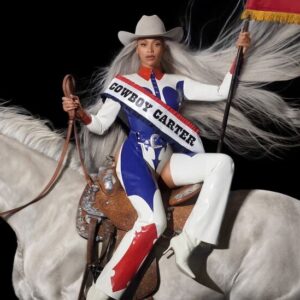Like the Converse Run Star Motions, the cover art for SWIM’s latest single, “Big Stepper,” is a distorted spectacle you can’t help but admire. Shrunken in posture, the aura surrounding him wants to acknowledge but is weary of the reaction that’ll come his way. It’s a bit of a contradiction. Meant to garner a response, the audacious design of the sneakers is not an argument with his pose. They’re the brokers who forge the long for acceptance with the disruption caused by his presence. “I think I have in the past shrunk myself and minimized myself in certain rooms or certain settings,” SWIM said. “you know, out of fear of judgment, or how to fear just, you know, being content.”
This isn’t a tale of an individual who lacks awareness of his upbringing. His father, Derek Stewart, was a former professional basketball player for ten years for the Betclic Élite in France, where SWIM, whose legal name is Coy Stewart, spent the first years of his life there. During the summer of 2008 in South Carolina, the film “Accidental Love” production crew offered Derek an invite to bring his family to the set to play as extras. During the hot, muggy day, SWIM left a lasting impression on the production crew with his infectious personality. Shortly after that, he told his parents that he wanted to try his hand at acting. A year later, he starred in the stage rendition of “Raising In The Sun.” From there, he’s gone on to appear on multiple shows on the TBS ‘Are We There Yet?’, Nickelodeon’s ‘Bella and the Bulldogs,’ and Marvel’s ‘Agents of S.H.I.E.L.D.’
From extra to childhood star to Hip Hop Artist, his self-awareness keeps SWIM from being diluted by his success. “I just always operated from like a place of gratitude,” he stated. “Especially being young and black, when you get an opportunity to see those things come into fruition.” Beneath the blaze of South Carolina’s summer wrath, he found a sense of joy in his surrounding. Locating shelter wasn’t an option when he was ten years old due to the setting being made for him, whether he knew it or not. It drew confidence out of him long before Hollywood pushed it back.
But his self-awareness is more than just his beginnings, but the situation company he keeps. Loved ones, and extended family, can’t begin to fathom the lifestyle he lives. No one does what he does, not due to a lack of talent, but due to the lack of access. Hard work and skill play a role in success, but luck is something that overlooks more often than not. It’s the Timmy Smith of traits. The omitted piece culminates in anyone’s success. Compared to his Hollywood peers and their warped sense of reality by the system that molded them.
Is that why he shrunk himself after so many roles? So many auditions? Despite all the accolades, he still sees himself as a talented actor who got lucky in nailing a couple of roles. Acknowledging that “a million other young, talented black people” could have played in ‘Are We There Yet’ or ‘Bella and The Bulldogs.’ It’s one thing to avoid feeding the ego; it keeps you humble and hungry. But to starve it, don’t you lose sight of the hard work and skill it took to get there?
He’s been a financial cog for both the entertainment industry and his loved ones since entering the industry. He was their source, the recipient, and the facilitator of everyone else dream and wealth—the holy trinity. It’s a business. Before he could understand anything about himself, he understood that money was the feudal lord everyone answered to.
Underneath his conversational and sarcastic delivery, there’s a dire struggle for power that hides behind his smile. It’s littered across his discography, signs of an insatiable quest to change the system, even if it means playing by the rules he hates. What he wants to do with his power is take those who couldn’t chase their passions and allow them to. Take those who come after him to achieve what they want and not what they must to survive. “I’m too busy taking your place/Just let me,” he says on the grouptherapy. track ‘blackout.’ The film and music industries’ power structures are similar but significantly different.
In the music industry, you have more control of creative direction, particularly if you’re independent. You decide the release date, the visuals, the rollout, where and who the money goes to, and more. There are artists with millions of streams, who still work day jobs to support themselves. Instead, their compensation comes from merch, booking fees, concert tickets, and brand deals. It’s volatile but a life-long passion project of self-expression and autobiography.
But some sounds and styles draw the most engagement and streams that cause you to second guess yourself. Unlike the film world, where a good narrative story sells, not the name, fans will come to watch whoever is in front of the camera. They might not stay, but they will come. It’s why acts like Julia Fox can become stars overnight. In the music world, if the fans don’t like you or your music, your passion project falls on bleeding ears. It’s why it’s easier to fall for that little voice in your head that tells you to give the rage a try. Influential in the art of persuasion, that voice is always there to deviate from your path, to receive the gratification you seek.
“Yeah, man, it’s hard. It’s hard as fuck.” SWIM exclaimed. “And it’s something that I think I’ve learned as I get older, honestly never goes away.”
Music is what shows you the real SWIM because, honestly, there isn’t any other way to succeed as an artist. And the best way to introduce yourself musically is to have a sound that identifies you. There’s no role to sink yourself into, and there’s no script written by someone else to immerse yourself into. Just having a sound isn’t the point for SWIM; the process of finding is exciting. Drake, JID, Earthgang, and Steve Lacy, are some artists he named who forged their signature sound(s). The pressure for him doesn’t exist; it’s the fear of losing himself when he does that drives him mad. “I think when you find that what’s even scarier is a departure from that [sound], or the idea that you may not be able to deliver that every single time.”
Which circles us back to ‘Big Stepper.’ There’s no pressure to find himself because his transition from KOI to SWIM was his first big step. He has accepted himself so that he can showcase his talents to others. He is fully delving himself into the idea of superhero SWIM because the aim is to achieve something never seen or heard before. The cover art may start as something to hide, but what if the meaning changed? Instead of being afraid of what a room of strangers will say about his art, what if it’s to protect something premature yet beautiful? What if the shades that cover his eyes are the same ones Cyclpose puts on to save the world from the light that shines in them? Growth always starts as one step, but the ones after will eventually lead you to something you’ve never seen before.








